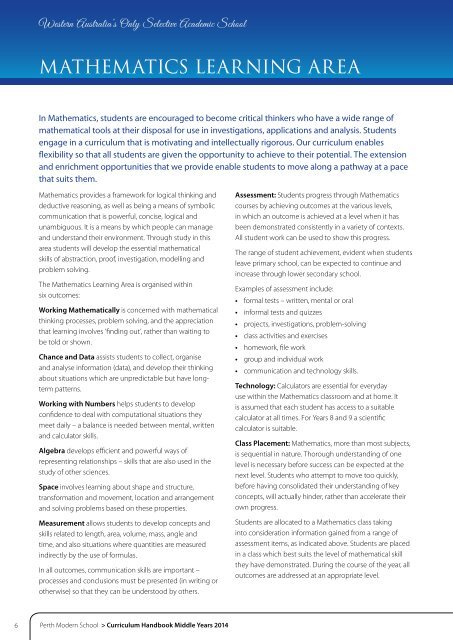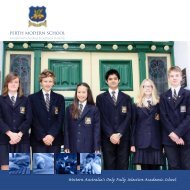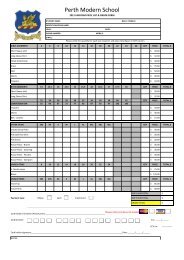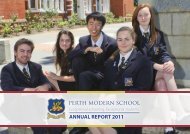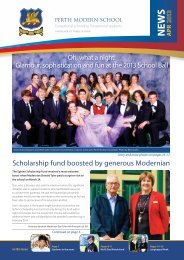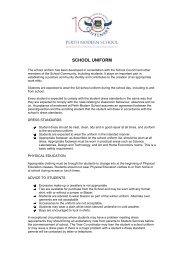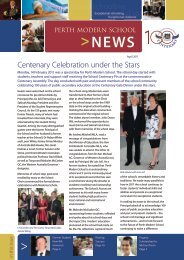Western Australia’s Only Selective Academic <strong>School</strong>Mathematics Learning AreaIn Mathematics, students are encouraged to become critical thinkers who have a wide range ofmathematical tools at their disposal for use in investigations, applications and analysis. Studentsengage in a curriculum that is motivating and intellectually rigorous. Our curriculum enablesflexibility so that all students are given the opportunity to achieve to their potential. The extensionand enrichment opportunities that we provide enable students to move along a pathway at a pacethat suits them.Mathematics provides a framework for logical thinking anddeductive reasoning, as well as being a means of symboliccommunication that is powerful, concise, logical andunambiguous. It is a means by which people can manageand understand their environment. Through study in thisarea students will develop the essential mathematicalskills of abstraction, proof, investigation, modelling andproblem solving.The Mathematics Learning Area is organised withinsix outcomes:Working Mathematically is concerned with mathematicalthinking processes, problem solving, and the appreciationthat learning involves ‘finding out’, rather than waiting tobe told or shown.Chance and Data assists students to collect, organiseand analyse information (data), and develop their thinkingabout situations which are unpredictable but have longtermpatterns.Working with Numbers helps students to developconfidence to deal with computational situations theymeet daily – a balance is needed between mental, writtenand calculator skills.Algebra develops efficient and powerful ways ofrepresenting relationships – skills that are also used in thestudy of other sciences.Space involves learning about shape and structure,transformation and movement, location and arrangementand solving problems based on these properties.Measurement allows students to develop concepts andskills related to length, area, volume, mass, angle andtime, and also situations where quantities are measuredindirectly by the use of formulas.In all outcomes, communication skills are important –processes and conclusions must be presented (in writing orotherwise) so that they can be understood by others.Assessment: Students progress through Mathematicscourses by achieving outcomes at the various levels,in which an outcome is achieved at a level when it hasbeen demonstrated consistently in a variety of contexts.All student work can be used to show this progress.The range of student achievement, evident when studentsleave primary school, can be expected to continue andincrease through lower secondary school.Examples of assessment include:• formal tests – written, mental or oral• informal tests and quizzes• projects, investigations, problem-solving• class activities and exercises• homework, file work• group and individual work• communication and technology skills.Technology: Calculators are essential for everydayuse within the Mathematics classroom and at home. Itis assumed that each student has access to a suitablecalculator at all times. For <strong>Years</strong> 8 and 9 a scientificcalculator is suitable.Class Placement: Mathematics, more than most subjects,is sequential in nature. Thorough understanding of onelevel is necessary before success can be expected at thenext level. Students who attempt to move too quickly,before having consolidated their understanding of keyconcepts, will actually hinder, rather than accelerate theirown progress.Students are allocated to a Mathematics class takinginto consideration information gained from a range ofassessment items, as indicated above. Students are placedin a class which best suits the level of mathematical skillthey have demonstrated. During the course of the year, alloutcomes are addressed at an appropriate level.6<strong>Perth</strong> <strong>Modern</strong> <strong>School</strong> > <strong>Curriculum</strong> <strong>Handbook</strong> <strong>Middle</strong> <strong>Years</strong> 2014
Western Australia’s Only Selective Academic <strong>School</strong>Science Learning AreaScience helps us to better understand the world we live in. Students are encouraged to ask why?at every opportunity. Scientists recognise a problem, collect information related to the problemand then come up with testable hypotheses which can be investigated. From these investigations,conclusions are drawn, in which the hypotheses are either rejected or accepted.During Year 8 and 9 students investigate different aspectsof the physical and natural world. Students will be giventhe opportunity to explore how scientists apply thescientific method in their research of the natural andphysical laws that govern the universe and specifically theworld in which we live.The key emphasis in <strong>Years</strong> 8 and 9 is to encourage andengage students in the love of learning. This is conductedthrough a variety of strategies aimed at encouragingstudents to think about their thinking. For each topicpre-tests, formal or informal, are given to allow students todemonstrate their pre-existing knowledge. Many of thesetasks are open-ended to allow the students the freedom toexpress their preferred learning style within the context ofthe question asked.Most, if not all, of the scientists who have seen significantbreakthrough in research have needed to apply many ofthe 16 Habits of Mind identified in Professor Art Costa’swork. In <strong>Years</strong> 8 and 9, although most of the Habits will beaccessed, there is a focus on four: Thinking about Thinking,Questioning and Posing Problems, Managing Impulsivity andStriving for Accuracy.Each student has the opportunity to enrich their sciencelearning by undertaking individual projects, by taking partin group projects such as those organised through theEngineering Club and Astronomy Club, or by participatingin activities and competitions organised by tertiaryinstitutions and professional associations. The learning linksalready established with the University of Western Australiaand the Institute of Child Health Research provide furtheropportunities for scientifically talented students.Also, there are two enhancement programs running inScience. Firstly, Thinking Science lessons are delivered atregular intervals throughout <strong>Years</strong> 8 and 9. Students aregiven problems to solve within the investigating sciencecontext. Secondly the Apprenticeship of Thinking, whichis a school wide priority. In Year 8 students learn to use arange of Thinking Routines around an area of science thatthey have identified themselves.The research identified needs to be critically analysed andstudents present a 30 second sound bite. The aim is todevelop a question which they can research further in theYear 9 3CTP project should they want to. The Science partof the Year 8 Thinking Program is conducted in Term 1.Year 8What does a Scientist do? Science Inquiry SkillsOur Science hero is: Aristarchus (310-230 BC). Hedemonstrated the Habits of Mind of Thinking Flexibly andCreating, Imagining and Innovating. An astronomer, hewas the first to suggest that the earth rotated on its axisand went around the sun once a year. He used carefulmeasurements to support his hypothesis. Aristotle (384 BC– 322 BC) refuted his claims and was more accepted in histime, even though he used no scientific methodology.The scientific method is a method of discoveringknowledge about the natural world based on makingfalsifiable predictions (hypotheses), testing themempirically, and developing peer-reviewed theories thatbest explain the known data. Students will be encouragedto research one of the Nobel Laureates in Biology,Chemistry, Physics or Medicine from the last 10 years.They will be asked to consider such questions as: What didthey research? How did they employ the scientific method?Can students apply what they learn from these scientists tothe experiments they conduct?Students are introduced to laboratory proceduresafter which the course focuses on the ‘scientificmethod’ which incorporates planning and conductingscientific investigations, processing data and evaluatingthe investigation.Out with a Bang: Chemical Sciences“Can we blow things up?” This is one of the most commonexpressions Science teachers hear. Students love chemicalreactions. In this course students will explore the differentproperties that different materials have and uses that relateto their properties. Do the properties of materials change iftheir state of matter changes?<strong>Perth</strong> <strong>Modern</strong> <strong>School</strong> > <strong>Curriculum</strong> <strong>Handbook</strong> <strong>Middle</strong> <strong>Years</strong> 2014 7


